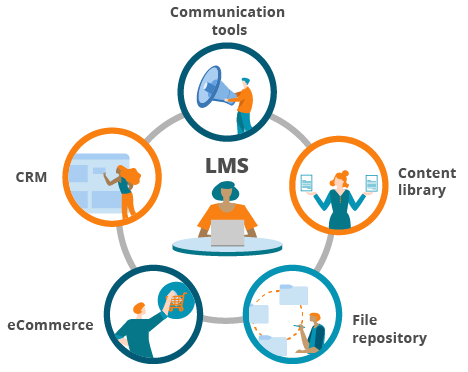In a previous blog post, we talked about how integrating an organisation’s LMS with their HR systems allows L&D departments to identify patterns, get a holistic view of their talent or keep their data up to date.
However, an LMS and HR system integration is not by far the only combination that organisations can benefit from. On the contrary, there is a wide variety of software that can integrate with a corporate LMS to help organisations as a whole and support processes, business goals and communication – especially relevant in these times of remote working.
Integrating your LMS with this software is much more than reducing admin time and improving the user experience for your team or customers: it’s about creating a digital ecosystem with software that optimises processes and helps your organisation reach business objectives, while keeping learning and development at the heart of business strategy.
Let’s have a look at some of the most common software integrations for LMS and the value they bring to organisations.
Foster collaborative work: integrate communication tools into your LMS
Integrating your LMS with tools for communication fosters collaborative work and knowledge sharing, keeps your teams connected and helps them stay informed. Some examples of these are videoconferencing tools like BigBlueButton or Zoom, or chat-based workspaces like Slack or Microsoft Teams.
Leverage existing valuable content: integrate a content library into your LMS
While creating your own learning and development content is necessary for those learning programs that are uniquely related to your business, there are many other learning gaps that can be closed using content created and curated by publishers and training providers specialised in workplace learning, like, OpenSesame, Udemy or LinkedIn Learning amongst others. With a content library – LMS integration, you ensure that your team is up to date with the latest skills, while you can still manage and track their learning on your own platform.
Make file-sharing easy: integrate a file repository into your LMS
File repositories like Google Drive, Dropbox, NextCloud or OneDrive allow you to store, organise and share all kinds of documents and files. A file repository – LMS integration enables you to access any of your files within your LMS itself. For example, if learners have to submit a file to be assessed, they can access their personal account on the repository your organisation uses, and directly attach the file from there.
Sell your courses easily: integrate an eCommerce into your LMS
To manage the commercial part of selling your courses, eCommerce platforms like Woocomerce, Arlo or Shopify, allows your customers to find your courses, add them to their shopping cart and pay through the eCommerce’s secure payment gateway. A good LMS – eCommerce integration will allow you to automatically enrol your customers into courses after payment and save up a lot of admin time.
Manage the relationships with your customers: integrate a CRM into your LMS
Customer Relationship Management software, such as Salesforce, Sugar CRM or Microsoft Dynamics, allows organisations to manage and track interactions with existing and potential customers. If your business goal is to sell training to other organisations or individuals, a CRM – LMS integration is key to marketing your courses and optimising sales through personalised, timely customer communication with your learners.
Single Sign-On: Creating a company-wide software ecosystem
The key to making the most out of integrating an LMS with other software is that both parts support Single Sign On (SSO). That is, they allow users to authenticate themselves only once in a software system, and then being able to access other related, but independent, software without having to re-authenticate themselves. SSO allows employees to navigate seamlessly from their corporate LMS to other integrated software systems, since they only have to use their login credentials once to access the LMS and they’re automatically authenticated in the rest of the software ecosystem.
Create a company-wide software ecosystem with Moodle Workplace
Moodle Workplace is an enterprise learning management system that supports SSO integration with countless software systems, whether it is native integrations or integrations through plugins.
If the integration that you need doesn’t exist through a native integration, plugin, or a Moodle Certified LMS integration, Moodle’s Premium Certified Service Providers can create an ad-hoc integration through Moodle’s API to customise Moodle Workplace to meet your business goals.




